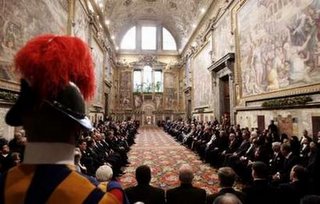
I see that many blogs, friendly or unfriendly, have been issuing long analyses of the Pontificate (here is a significant example).
I perfectly understand the impatience, though we must keep in mind that there will be no "restoration". This is not the style of this pragmatic pope.
Will there be anything for those Catholics particularly attached to the traditional rites of the Latin Church? I am pretty sure there will be and there are several bright indications of this. The famous Panorama article on the "Holy Revolution" confirmed the many sources who had indicated that the fall/promotion of Abp. Sorrentino from the position of secretary of the Congregation for Divine Worship ("promoted" to Assisi) was directly related to the internal memo (revealed by Andrea Tornielli in Il Giornale right after the Synod of Bishops) which had declared that the Traditional Missal had been "abolished".
As is widely known, the Pope nominated to his place a man considered at least friendly to traditionalists. The move was significant because it was the only important dismissal of any name in the Congregations since the Pope was elected. This is not all: there are also signs from all different places, inside and outside the Vatican, which show there will be interesting news in this field -- "he that hath ears to hear, let him hear"...
That there is a large-scale reform of the Curia (and, therefore, of the central administration of the Church) being planned is something which can be considered certain. This reform is being spearheaded by two men: Archbishop Comastri and Cardinal Nicora, President of the Patrimony of the Holy See. Comastri, already referenced here earlier, is almost certainly the "administrative" planner of the "New Curia", while Nicora is the "financial" planner.
Everything is eerily calm in the Holy See. The silence will probably be broken in the next few days with the publication of the first encyclical (eight months into the pontificate, Benedict's is the most delayed inaugural encyclical of all modern popes); but it seems that the administrative calm will not be changed until the slim version of the Roman Curia is finally announced. This much-neglected article (dated December 13, 2005) mentions the current "ecclesiastical acedia" in which most curial officers have nothing to do; and that Cardinal Nicora (who has had the longest audience with the Pope so far) has received the "charge to elaborate a project to 'slim down' the various offices and projects which grew like mushrooms during the Wojtyla pontificate".
So a long year ahead awaits the Catholic Church. Will Benedict content himself with being a mere "transition pope"? Will he, the one who bravely, in less than one month, diagnosed the deep crisis through which the Church is going (Via Crucis 2005) and proposed a program for reform (Pre-Conclave Speech) be known simply as "the shy pope"? Do not bet on this. He hates "rupture" and upheaval, but he knows he has a job to do -- a job to which he has been called.
I perfectly understand the impatience, though we must keep in mind that there will be no "restoration". This is not the style of this pragmatic pope.
Will there be anything for those Catholics particularly attached to the traditional rites of the Latin Church? I am pretty sure there will be and there are several bright indications of this. The famous Panorama article on the "Holy Revolution" confirmed the many sources who had indicated that the fall/promotion of Abp. Sorrentino from the position of secretary of the Congregation for Divine Worship ("promoted" to Assisi) was directly related to the internal memo (revealed by Andrea Tornielli in Il Giornale right after the Synod of Bishops) which had declared that the Traditional Missal had been "abolished".
As is widely known, the Pope nominated to his place a man considered at least friendly to traditionalists. The move was significant because it was the only important dismissal of any name in the Congregations since the Pope was elected. This is not all: there are also signs from all different places, inside and outside the Vatican, which show there will be interesting news in this field -- "he that hath ears to hear, let him hear"...
That there is a large-scale reform of the Curia (and, therefore, of the central administration of the Church) being planned is something which can be considered certain. This reform is being spearheaded by two men: Archbishop Comastri and Cardinal Nicora, President of the Patrimony of the Holy See. Comastri, already referenced here earlier, is almost certainly the "administrative" planner of the "New Curia", while Nicora is the "financial" planner.
Everything is eerily calm in the Holy See. The silence will probably be broken in the next few days with the publication of the first encyclical (eight months into the pontificate, Benedict's is the most delayed inaugural encyclical of all modern popes); but it seems that the administrative calm will not be changed until the slim version of the Roman Curia is finally announced. This much-neglected article (dated December 13, 2005) mentions the current "ecclesiastical acedia" in which most curial officers have nothing to do; and that Cardinal Nicora (who has had the longest audience with the Pope so far) has received the "charge to elaborate a project to 'slim down' the various offices and projects which grew like mushrooms during the Wojtyla pontificate".
So a long year ahead awaits the Catholic Church. Will Benedict content himself with being a mere "transition pope"? Will he, the one who bravely, in less than one month, diagnosed the deep crisis through which the Church is going (Via Crucis 2005) and proposed a program for reform (Pre-Conclave Speech) be known simply as "the shy pope"? Do not bet on this. He hates "rupture" and upheaval, but he knows he has a job to do -- a job to which he has been called.